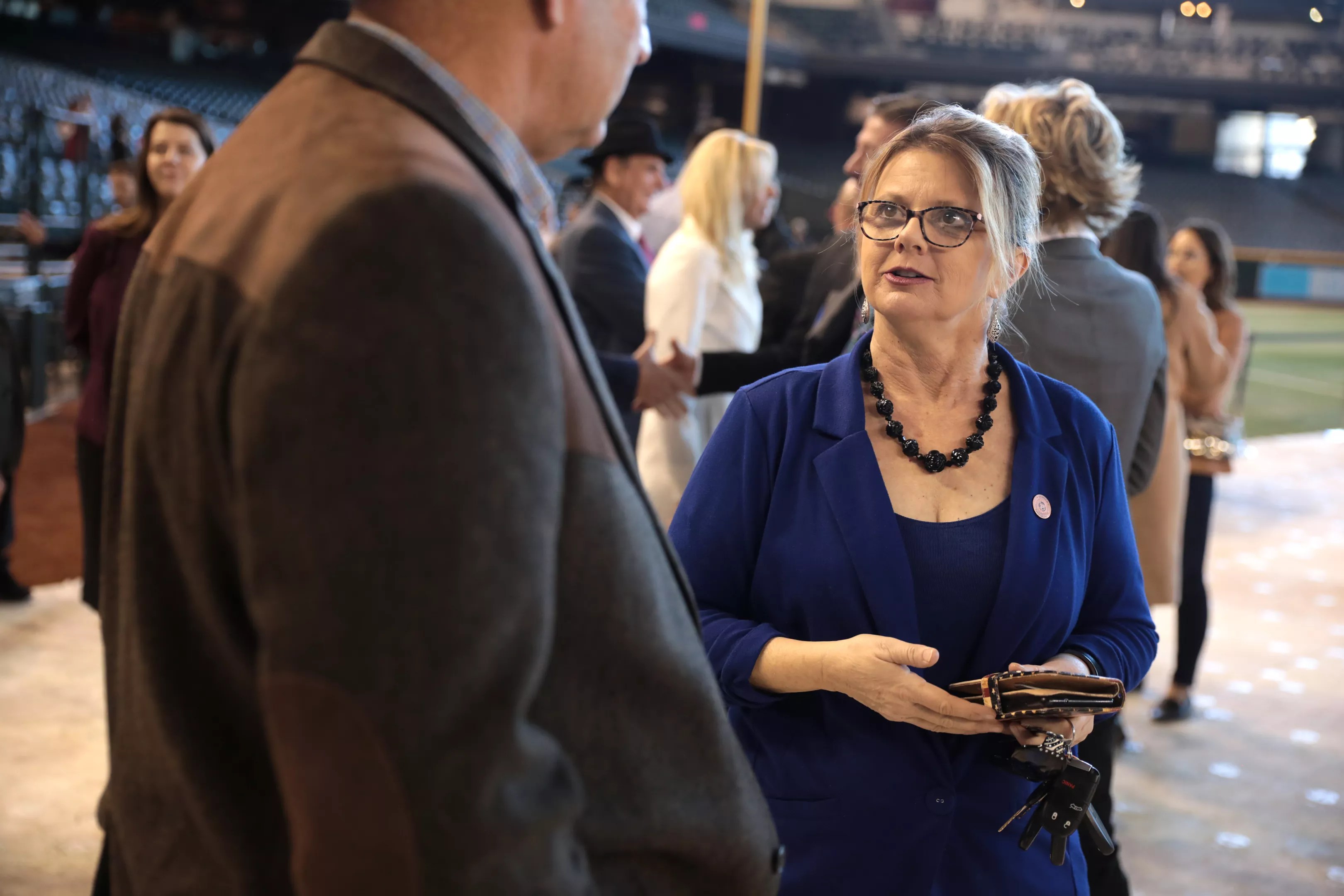
Gage Skidmore

Audio By Carbonatix
Arizona Republicans have yet to exhaust their attempts to undermine the legitimacy of the 2020 presidential election results in Maricopa County.
Despite a string of so-called “audits” failing to find substantial evidence against the facts – that President Joe Biden defeated former President Donald Trump by more than 10,000 votes in Arizona – GOP leaders in the Arizona Senate aren’t waving the white flag yet.
State lawmakers are continuing to grill Maricopa County officials, this time with a new subpoena for voter records.
“Famously, Arizona saw a coordinated effort at election denial centered at Maricopa County,” said David Becker, executive director and founder of the nonpartisan, nonprofit Center for Election Innovation and Research in Washington, D.C.
“Perhaps because of an undermining of our democratic process by the losing presidential candidate, we have seen unprecedented attacks on … election officials in Maricopa County.”
Republican Kelly Townsend, chairwoman of the Senate Government Committee, issued a new legislative subpoena to the Maricopa County Board of Supervisors last week.
She’s demanding records related to voter registration and early ballots – something state Republicans are seeking to quash with legislation and a Supreme Court lawsuit.
This time, the first-term state senator from Mesa is focusing her efforts on the debunked findings of Shiva Ayyadurai, an anti-vaccine politician and election conspiracy theorist commissioned by Senate President Karen Fann as part of what others called a “sham” election integrity probe in Maricopa County.
“It saddens me greatly,” Becker said. “These attacks weaken American democracy, and they haven’t stopped.”
Townsend is looking for voter registration records, contact with voters whose early ballot affidavit signatures were rejected, and the county’s signature verification protocol.
She’s also demanding the signatures that election workers used to verify early ballots in 2020, she said.
After 16 months of constant scrutiny, Maricopa County is exhausted. And worried.
“I am concerned about the future,” said Republican Bill Gates, chairman of the Maricopa County Board of Supervisors. “We continue to deal with this investigation on a daily basis.”
The post-Trump divide in Arizona’s GOP is exemplified by Townsend’s contentious relationship with Gates.
It all comes down to early voting.
In 2020, 90 percent of ballots in Maricopa County were cast in the mail.
Gates celebrates this fact, but Townsend’s committee last Thursday passed House Bill 2289, sponsored by Apache Junction Republican John Fillmore, which would put an end to early voting and require ballots to be counted by hand.
Now, the bill could see a Senate-wide vote.
“The partisan and discredited ‘audit’ of Maricopa County’s election concluded months ago, but that also hasn’t signaled the end of Arizona conservatives’ efforts to drum up support for baseless voter-fraud claims,” America Oversight, a nonpartisan, nonprofit watchdog group based in Washington, D.C., said in a statement.
Arizona Attorney General Mark Brnovich’s Election Integrity Unit is seeking similar records in an investigation of Fann’s partisan audit.
Assistant Attorney General Jennifer Wright, who heads up the Election Integrity Unit, joined Townsend in citing Ayyadurai’s findings in subpoenas and letters to Maricopa County.
Wright “is in receipt of two pilot studies conducted by Dr. Shiva Ayyadurai,” and needs copies of Arizona voter registration records “in order to accurately assess the issues raised in the report,” she wrote to the county on March 9.
Ayyadurai, an outspoken proponent of the largely debunked conspiracy theory that the 2020 election was fixed, released a “scientific study” late last month claiming that more than 200,000 Arizona ballots with mismatched signatures were not reviewed.
Brnovich declined to respond directly to why he places enough credence in Ayyadurai’s findings to warrant a further look.
“We are not going to discuss specific investigative techniques of a review that is ongoing,” said Katie Conner, the lead spokesperson for the Arizona Attorney General’s Office. “As a prosecutorial agency, we deal in facts and evidence, not rumors or gossip. We decline to comment further on the review of the audit.”
An independent study of voting machines in Maricopa County, the final audit report in the Senate’s partisan review, debunked another popular myth in a report released this week that the machines were connected to the internet.
The report “should be a final stake in the heart of the Senate’s so-called audit,” Gates said.
He responded to Townsend’s subpoena by surrendering the records she requested on Monday.
For now, “the attacks continue,” Gates said. “My colleagues and I are literally called traitors on a daily basis.”
Townsend was tight-lipped when confronted about what she expected to find in the records that Gates surrendered this week.
If there is any damning evidence to support her promise to overturn the results of the 2020 election, she hasn’t found it yet.
“I wanted them to give to the Attorney General the items requested,” Townsend told New Times. “That was the goal of that subpoena and it was complied with, so no further action on that issue is currently necessary.”
In the meantime, she looks to evoke drastic changes to Arizona’s democratic process, which she claims is infected with fraud, setting Election Day in Arizona back to a voting experience reminiscent of what it was generations ago.
Twenty-four hours to vote, in-person only.
Since folding her congressional bid early this month, Townsend is pursuing a second term in the Arizona Senate to keep the dream alive.
Nixing early voting is a threat to all Arizona voters, Gates asserts. Not only is it an accessibility issue, but it’s also the preferred voting method of most Republican voters in the state.
“These threats are alive in Maricopa County,” Gates said.